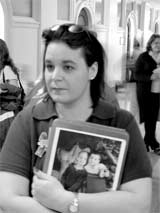Student advocates for her children

Rona Brumback, senior psychology major, holds her clipboard and pictures of her children close as she waits for and opportunity to talk to state legislators on March 9. Brumback´s children, Amber and Caden, have both been diagnosed with Asperger´s Syndrome, an Autistic Spectrum disorder.
JEFFERSON CITY – When potentially harmful funding cuts were announced for the Southwest Missouri Autism Project, a mother’s natural protective instincts for her children were alerted.
Rona Brumback, a single mother and senior psychology major, responded to the treats to remove therapeutic treatment funding for her two children by speaking out.
Brumback went to the state capital on March 9 to advocate for her children, and for other autistic children, by creating a human connection with legislators.
Both of her children have been diagnoses with Asperger’s Sydrome, an Autistic Spectrum disorder.
She distributed pictures of her children and told their story.
“You can’t teach an autistic child in the same way as a regular child,” Brumback said.
Services provided by the Southwest Missouri Autism Project (SWAP), a part of Judevine Outreach Services, help bridge the gap between autistic and traditional parenting and teaching methods.
SWAP provides, among other things, specialized training for parents and professionals, community inclusion, respite and crisis care.
“Before we used Judevine, I could hardly take my son out in public,” Holli Thornsbery said.
Thornsberry’s son Jacob now attends a regular kindergarten class and is able to go on school field trips.
“He is not being completely overloaded with everything going on,” Thornsberry said. “He can have fun, do things, like with other kids his age.”
More than 30 family members and children with autism took part in the timely advocacy effort.
The House Appropriations Committee was due to begin the mark-up process for the Department of Mental Health budget later on March 9, with executive committee continuing through March 10.
Several parents brought along their children, many of whom have autism, to be recognized and given honorary roles as pages on the chamber floors of both the House and Senate.
Issac Dunigan, 12, was recognized by Rep. Bob Dixon (R-Springfield). Later, Dunigan spoke to several senators about the importance of Judevine and SWAP.
SWAP covers 24 counties in Southwest Missouri with only nine full time staff who traveled a total of 129,600 miles last year.
During the current fiscal year, SWAP has served 720 families.
There are currently 150 families on the waiting list.
Jim Trout, from Buffalo, traveled with SWAP to advocate on behalf of his son, Patrick.
Patrick was first diagnosed with autism when he was three years old.
He is non-verbal and has limited non-verbal communication skills.
The Trout family was referred to SWAP by the Springfield Regional Center. After spending time on a waiting list, Patrick was evaluated in June 2004.
Since then, the Trout family has been on another waiting list. They were notified recently Patrick has been assigned a case manager, but there has not been an appointment.
“[I want] any kind of help for normalcy,” Trout said.
Trout and Thornsberry said insurance companies do not provide all of the services available through SWAP.
Even when insurance covers part, there are short treatment time limits before improvement must be demonstrated to continue services.
Some aspects of service at SWAP are limited as well.
“My kids are on a waiting list for a music therapist,” Brumback said.
There is only one music therapist for the 24 counties in the Southwest region.
“I was encouraged by the responses from some senators who seemed to understand,” Brumback said. “Yet, there were a lot who acted like they did not care.”
According to material provided by the Autism Coalition, Autism is more prevalent than Down Syndrome, juvenile diabetes and childhood cancer combined.
Your donation will support the student journalists of Missouri Southern State University. Your contribution will allow us to purchase equipment and cover our annual website hosting costs.















